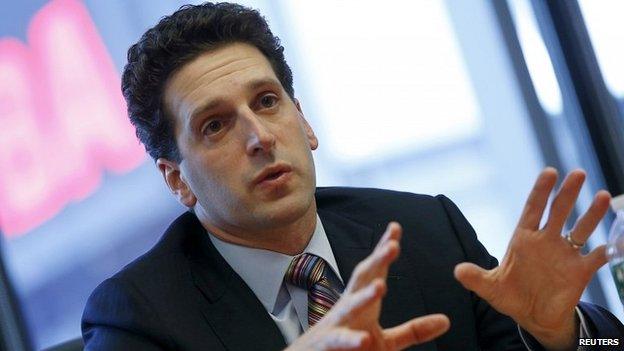US banking justice - Ben Lawsky style
- Published
- comments

Benjamin Lawsky wants tougher action to make sure banks clean up their act
Another day, another major fine for a European bank.
Today, probably at the close of markets in America, BNP Paribas will become the latest bank to join the ignominious list of financial institutions hauled into the dock by US regulators for misconduct.
BNP will join HSBC (fined $2bn (£1.2bn) in December 2012 following money laundering allegations), Standard Chartered (fined $300m for breaking sanctions against Iran), Royal Bank of Scotland (fined $100m in December 2013 for similar offences) and Credit Suisse (fined $2.6bn for enabling US clients to evade taxes).
Barclays is also in the sights of the US regulators. Following its Libor fine, the bank has now been named in a lawsuit over the operations of its "dark pool", a private trading platform for institutions to deal shares.
Apart from Barclays, one name links all these cases. Benjamin Lawsky, the superintendent of the Department of Financial Services, the main New York State regulator.
Mr Lawsky is a name now high on the speed dial list of every major banking chief executive.
It was not always so. Peter Sands, the chief executive of Standard Chartered, would have been hard pressed to say much about him when allegations of American sanctions-busting were first detailed in a lawsuit compiled by Mr Lawsky.
The US media knew more about the allegations and the man behind them than Britain's fifth-largest bank.
Which might tell us more about Standard Chartered than American journalism.
'Heads roll'
Mr Lawsky's approach is very different from European regulators. Evidence is published and incendiary claims detailed.
Mr Lawsky has also made it clear that fining institutions is not enough. "Corporations are a legal fiction. You have to deter bad individual conduct within corporations," he said in an interview with The Financial Times in March, external.
Mr Lawsky wants to see heads roll.
His Twitter feed, alongside musings on the US football team's performance in the World Cup, includes supportive links to editorials attacking those seeking to defend European banks.
One such article appeared in the Wall Street Journal, external.
Its main argument? "Friendly members of the fourth estate aren't the only ones rushing to defend French bank BNP Paribas for allegedly violating US sanctions against Iran and Sudan. Virtually the entire French governing elite has decided that the most pressing economic issue facing the country isn't slow growth and high unemployment, but how to protect a too-big-to-fail bank from the consequences of its actions."
If you want to know what Mr Lawsky thinks about the knotty problem of how to actually punish a bank so it makes a difference, it is worth finding 12 minutes of your day to listen to this National Public Radio "Planet Money" broadcast, external.
It quotes one magazine profile of Mr Lawsky that described him as the "toughest cop on Wall Street". During the broadcast, you can hear Mr Lawsky, admittedly on a pretty scratchy smartphone recording from the back of the hall, saying that the constant uncovering of bad behaviour is "like Groundhog Day for the regulators".
He asks what are regulators "doing wrong" that they are still uncovering bad behaviour six years after the financial crisis.
And why banks are still behaving in the way they are.
Effective deterrent?
Is BNP's fine the "right way" to punish banks? Will the signal finally change cultures?
Certainly, it is of a size (equivalent to a year's profits) that could affect the bank's capital position.
That could raise the prospect of a cut in dividend, a capital raise via debt (issuing bonds) or equity (issuing shares) or a mixture of all three.
Raising money in the markets is always risky. The need for a prospectus opens up fresh opportunities for "bad stuff" to be revealed. The share price can become more volatile.
And, as the second biggest bank in Europe, BNP is also subject of the European Central Bank stress tests which are due to report in the autumn.
The bank's balance sheet is certainly going to be under a lot of scrutiny.
Mr Lawsky has alighted on the fact that the size of the fine is at least a partial solution to the issue of making reparations count.
Add that to a "heads must roll" approach and the US regulators certainly appear more aggressively on the front foot than those in Europe.